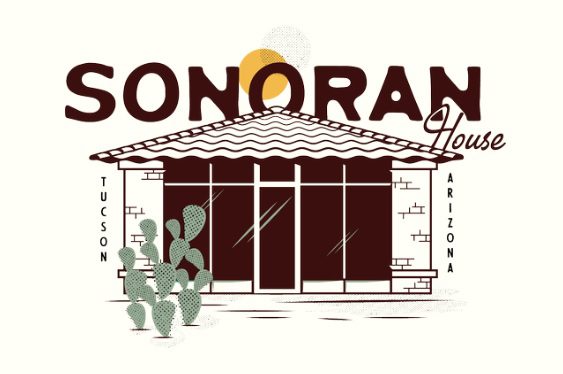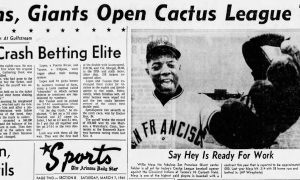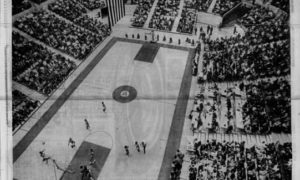[rps-paypal]
[ezcol_1half id=”” class=”” style=””]

— General history
— The games
— Comparisons then and now
— Wildcats nickname
— Military service
— Rankings
[/ezcol_1half]
[ezcol_1half_end id=”” class=”” style=””]
Excerpt from L.A. Times, Nov. 8, 1914, authored by Bill Henry:
“Arizona’s cactus-fed athletes, despite heroic efforts on the part of their two halfbacks, (Asa) Porter and (Franklin) Luis, went down to defeat before the Occidental Tigers yesterday afternoon, the tally with all precincts heard from being 14 to 0 in favor of the Tigers.
Confident of rolling up a big score, the Tigers took the field with grins on their faces, but before the game was 10 seconds old they knew they had a battle on their hands.
The Arizona men showed the fight of wild cats and displayed before the public gaze a couple of little shrimps in the backfield who defied all attempts of the Tigers to stop them.”This site will conduct a countdown in a 100-day period, leading up to Arizona’s 2014 football season-opener with UNLV on Aug. 29 at Arizona Stadium. The 100 Days ‘Til Kickoff countdown will include information daily about the historic 1914 Arizona team that helped create the school’s nickname of “Wildcats” because of how they played that fateful day against Occidental.
[/ezcol_1half_end]
[ezcol_1half id=”” class=”” style=””]
The words “infraction” or “probation” had no meaning to college football in 1914.
The NCAA was only four years into its existence in 1914. The organization really had no relevance at that time other than attracting schools to form a membership. No full-time administrators were employed by the NCAA until 1951.
A governing body of intercollegiate athletics as we know it today was not in operation in 1914. The game was without structure and mandatory requirements.
Potential violations perpetrated today, such as taking money from boosters based on performance, was a welcomed, common practice in 1914.
[/ezcol_1half]
[ezcol_1half_end id=”” class=”” style=””]
[/ezcol_1half_end]
J.F. “Pop” McKale and members of his team received at least $150 from two prominent Tucson men for defeating Pomona College in Arizona’s first homecoming game in 1914. According to the 1979 book “They Fought Like Wildcats” by Abe Chanin, the game against Pomona on Thanksgiving Day created so much excitement that gifts were being offered left and right.
“M.P. Freeman, a former chancellor of the regents, offered the Arizona team $50 if it won,” Chanin writes. “And then, as the crowd circled the field for the game, Joe Scotti, who owned the Opera House Theater, doubled the offer.”
Arizona prevailed 7-6 and became $150 richer. That amount of money in 1914 equates to almost $3,500 today using an inflation calculator.

The 1914 Arizona football team that earned the honor of being named the first “Wildcats” was composed of (front row, left to right): Verne La Tourette, George Seeley, Leo Cloud, Richard Meyer, Asa Porter. Second row: Franklin Luis, Lawrence Jackson, Ray Miller, J.F. “Pop” McKale (coach), Turner Smith, Harry Hobson (manager), Orville McPherson, Albert Crawford, Ernest Renaud. Back row: Albert Condron, Emzy Lynch, Charley Beach, Vinton Hammels, Bill Hendry, George Clawson, Harry Turvey.
(AllSportsTucson.com graphic/Photo from University of Arizona Library Special Collections)
[ezcol_1half id=”” class=”” style=””]
No telling where that money went. McKale could have kept it to help fund Arizona’s fledgling athletic program. He could have spread the wealth with some of his players. The gifts by Scotti and Freeman (those that are known) were 11 percent of McKale’s salary of $1,700. It was a hefty sum in that era.
No investigations were necessary concerning the good deeds of Scotti and Freeman and other business leaders at that time. College athletics was too fresh and unassuming.
The current NCAA enforcement mechanism was not created until 1952.
The steep escalation of spending (operating expenses, salaries, etc.) and outrageous value of TV contracts today make 100 years ago seem like the biblical times.
[/ezcol_1half]
[ezcol_1half_end id=”” class=”” style=””]
[/ezcol_1half_end]
On the eve of Arizona’s game against Occidental — the fateful game in which Arizona earned its nickname of “Wildcats” — McKale and his team saved on expenses by sleeping on the train that transported them from Tucson to Los Angeles.
“The varsity from the hot State arrived at the Arcade Station last night at 9:30 o’clock,” a Los Angeles Times story reads on the day of the game. “Its car was run onto a side track and the players just rolled over in their berths and snored until morning.”
Charter planes and overnight stays at plush hotels are the norm nowadays for Arizona and other major-college football teams.
No question McKale and his players from that generation 100 years would accept the means by which coaches and players function today. They would welcome gifts today as they did back then, as long as it was legal, of course.
ALLSPORTSTUCSON.com publisher, writer and editor Javier Morales is a former Arizona Press Club award winner. He also writes articles for Bleacher Report and Lindy’s College Sports.





























